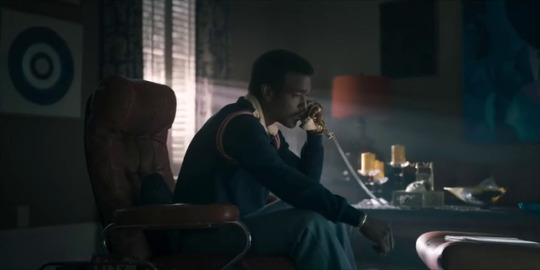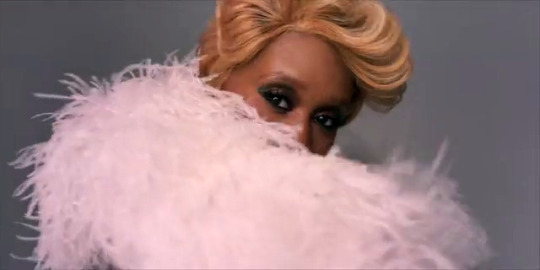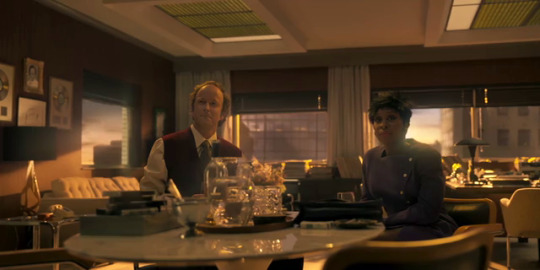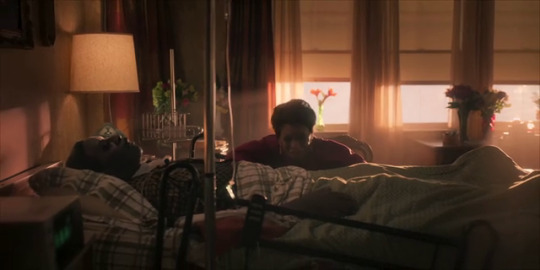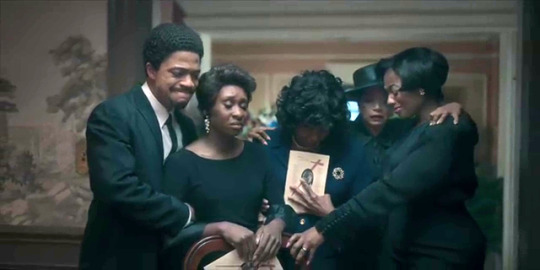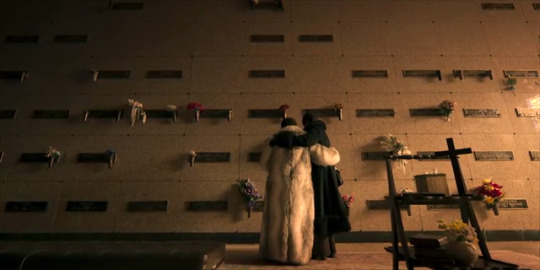#genius: aretha
Text
Smokey Robison & Aretha Franklin improv performance of “ Ooo Baby Baby” 💕
143 notes
·
View notes
Text
Article text: BEYONCÉ HAS SO many audacious culture-clash triumphs all over Cowboy Carter. But one of the most stunning moments is also one of the simplest: her version of the Beatles classic “Blackbird.” Paul McCartney wrote the song in the summer of 1968, inspired by the American civil rights movement. All that history is right there in Beyoncé’s version. She keeps the folkie Paul guitar, complete with the squeaks, but adds her heavenly gospel-soul harmonies. What she does with the word “arise” is incredible in itself.
It’s a stroke of Beyoncé’s revisionary genius that brings the story of “Blackbird” full circle. She claims the song as if Paul McCartney wrote it for her. Because, in so many ways, he did.
Paul tells the story of writing it in his 2021 book The Lyrics. “At the time in 1968 when I was writing ‘Blackbird,’” he recalls, “I was very conscious of the terrible racial tensions in the U.S. The year before, 1967, had been a particularly bad year, but 1968 was even worse. The song was written only a few weeks after the assassination of Martin Luther King Jr. That imagery of the broken wings and the sunken eyes and the general longing for freedom is very much of its moment.”
Paul wrote this song as a dialogue with Black America; Bey’s “Blackbird” is part of that call-and-response, proof that the song always meant exactly what McCartney hoped it would mean. It’s one of the most profound and powerful Beatles covers ever, right up there with Aretha Franklin’s “The Long and Winding Road.”
“I had in mind a Black woman, rather than a bird,” Paul says of the song in the 1997 book Many Years From Now, by Barry Miles. “Those were the days of the civil rights movement, which all of us cared passionately about, so this was really a song from me to a Black woman, experiencing these problems in the States: ‘Let me encourage you to keep trying, to keep your faith, there is hope.’”
#beyonce#paul mccartney#rob sheffield#I love this cover#the American Requiem to Blackbird to 16 Carriages sequence is so good!#I also love Daughter#and My Rose and Bodyguard and Alligator Tears#and I’m not even done yet!
53 notes
·
View notes
Text
Yesterday we venerated Ancestor Rosetta Tharpe on her 108th birthday. 🎉
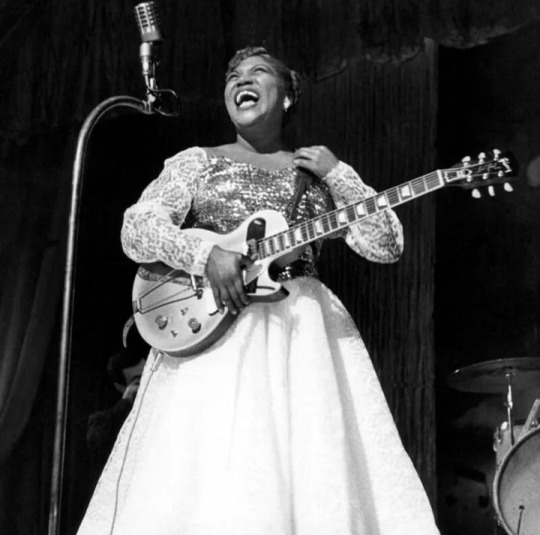
Definitively crowned as THE Godmother of Rock N Roll, Sister Rosetta Tharpe was a trailblazing pioneer whose legacy continues to inspire, revolutionize, & cement our footprint in America's arguably longest standing music genres.
Sister Rosetta Tharpe's musical genius is found at the crossroads between the old church house & 40s nightclubs. Born to a family of traditional evangelists & cotton pickers, she grew up in a world immersed in music & performance. She'd go on to engineer an infusion of Delta Blue's, New Orleans Jazz, & Gospel. Her unique playing style paired with her striking range in voice was both enthralling to her fans & appalling to her church family & folks. As if being a woman & Negro holding a guitar wasn't enough, her audacity compelled her to find the sweet harmonious center in secular themed music. Her sexually charged songs lined with faithful praise and gritty giration marked a collective shift in the midst of the Prohibition Era & WWII in what was viewed as popular music among Black and Mixed audiences.
She is the powerhouse that gave voice, sound, & style to the legendary likes of Chuck Berry, Little Richard, Aretha Franlkin - and to the leeching likes of Elvis & Johnny Cash who began to sample her blueprint at the downswing of her 40 year long career. It was the swing of her hips paired with the strum of her guitar that ignited the international sensation that we call, Rock, today & the array of subgenres that stem from it. We owe it ALL to Sister Rosetta Tharpe.
"Can't no man play like me!” - Sister Tharpe
We pour libations & give Sister Rosetta Tharpe her due 💐 for her fearless heart & raw talent, who's ripple effect charted our course in music history.
Offering suggestions: play her music, a COGIC Bible verse, & libations of whiskey or gin.
<< FINAL copies of The 2023 Hoodoo's Calendar are available for purchase. Subscribe to the official e-newsletter for the latest updates & exclusive content access. Link in bio🌟 >>
#the hoodoo calendar#hoodoos#hoodoo#atr#atrs#ancestor veneration#rosetta tharpe#Godmother of Rock n roll#rock n roll#black music history#cogic
107 notes
·
View notes
Text
This Moment to Arise: The Revisionary Genius of Beyoncé’s ‘Blackbird’
By Rob SheffieldMarch 29, 2024
'Cowboy Carter' highlight brings the White Album classic full circle
Beyoncé has so many audacious culture-clash triumphs all over Cowboy Carter. But one of the most stunning moments is also one of the simplest: her version of the Beatles classic “Blackbird.” Paul McCartney wrote the song in the summer of 1968, inspired by the American civil rights movement. All that history is right there in Beyoncé’s version. She keeps the folkie Paul guitar, complete with the squeaks, but adds her heavenly gospel-soul harmonies. What she does with the word “arise” is incredible in itself.
It’s a stroke of Beyoncé’s revisionary genius that brings the story of “Blackbird” full circle. She claims the song as if Paul McCartney wrote it for her. Because, in so many ways, he did.
Paul tells the story of writing it in his 2021 book The Lyrics. “At the time in 1968 when I was writing ‘Blackbird,’” he recalls, “I was very conscious of the terrible racial tensions in the U.S. The year before, 1967, had been a particularly bad year, but 1968 was even worse. The song was written only a few weeks after the assassination of Martin Luther King Jr. That imagery of the broken wings and the sunken eyes and the general longing for freedom is very much of its moment.”
Paul wrote this song as a dialogue with Black America; Bey’s “Blackbird” is part of that call-and-response, proof that the song always meant exactly what McCartney hoped it would mean. It’s one of the most profound and powerful Beatles covers ever, right up there with Aretha Franklin’s “The Long and Winding Road.”
Popular on Rolling Stone
“I had in mind a Black woman, rather than a bird,” Paul says of the song in the 1997 book Many Years From Now, by Barry Miles. “Those were the days of the civil rights movement, which all of us cared passionately about, so this was really a song from me to a Black woman, experiencing these problems in the States: ‘Let me encourage you to keep trying, to keep your faith, there is hope.’”
Editor’s picks
Paul was especially moved by the Little Rock Nine — a group of teenagers, the same age as so many Beatlemaniac fans, who caused a nationwide racist outrage in 1957 when they tried to enroll in an all-white high school in Little Rock, Arkansas. Gov. Orval Faubus called out the National Guard to block the kids from setting foot in the school. Writing “Blackbird” in the summer of 1968, with high-profile anti-Black violence in both the U.S. and the U.K., he turned that into the song. “As is often the case with my things, a veiling took place so rather than say ‘Black woman living in Little Rock’ and be very specific, she became a bird, became symbolic, so you could apply it to your particular problem.”
“Blackbird” is a song with a long history in Black music, from reggae (the Paragons’ gorgeous version from 1973) to jazz legends including Ramsey Lewis, Sarah Vaughn, and Cassandra Wilson. No song has a deeper dialogue between the Beatles and the Black America that gave them their voices. Anderson .Paak put his spin on “Blackbird” in 2013, years before he ended up contributing to Paul’s album McCartney 3 Imagined, with his funk remix of “When Winter Comes.” The Beatles’ sidekick Billy Preston, who plays with them all over the Get Back movie, gospelized it in 1972, as the flip side of his Number One hit “Will It Go Round in Circles.” His version is on the superb Ace Records anthology Come Together: Black America Sings the Beatles.
Beyoncé brings all that history to her version. There’s also a Paul-like playful humor in the way she makes a horse the star of her album cover. (Could Chardonneigh be the new Martha?) In other words, she is Macca Fierce.
But most of all, Bey’s version ties in mostdirectly to Sylvester’s disco version of “Blackbird” from 1979, the most outrageous and radical version ever. She evokes this song’s history in queer Black disco culture— connecting it to her whole Renaissance project. Sylvester was the first gay Black pop star who was out of the closet, as far as the public knew. Tragically, he also become one of the first stars to pass in the Eighties AIDs epidemic. But in 1979 he was back in San Francisco as a hometown hero, after breaking big nationwide. “Blackbird” is his falsetto-disco celebration from Living Proof, one of the Seventies’ greatest live albums. He was on top of the world: There was an official “Sylvester Day” in San Francisco, where he received the key to the city from the mayor, who happened to be Diane Feinstein. That night he headlined the War Memorial Opera House, and did the most beautiful “Blackbird” ever heard — until now.
Related
Sylvester claims “Blackbird” for himself and his community. He trades call-and-response vocals (“Y’all ready, girls?”) with his backup singers, eternal disco legends Martha Wash and Izora Rhodes, the Two Tons o’ Fun. (They later blew up as the Weather Girls, belting their classic “It’s Raining Men.”) When they sing “You were only waiting for this moment to arise,” you can feel the whole crowd rise to join them. They’re not hiding out in the shadows anymore. They’re spreading their wings. It’s their night to fly. This is their song, and their moment.
Hearing Beyoncé sing this song now evokes her Uncle Johnny, a member of the queer Black dance culture that Sylvester epitomized, and the guiding spirit of her love letter to that culture, Renaissance. (He died tragically in the same epidemic as Sylvester, 10 years later.) You can hear her “arise” connect with Sylvester’s “arise.” And you can hear her Uncle Johnny in both of them.
Beyoncé has always loved reclaiming rock & roll as Black female performance. It’s one of her artistic passions — check her mind-blowing versions of the Doors’ “Five to One,” Alanis Morissette’s “You Oughta Know,” and even Kings of Leon’s “Sex on Fire.” She turned the Yeah Yeah Yeahs into “Hold Up.” Long before Stevie Nicks had her grand 2010s comeback, Destiny’s Child got her back on MTV with “Bootylicious.” Most spectacularly, the Lemonade classic “Don’t Hurt Yourself” is Beyoncé channeling Memphis Minnie’s “When the Levee Breaks” through Led Zeppelin, with Jack White wailing on guitar. But “Blackbird” is different, because McCartney wrote the song explicitly about Southern Black women and their struggle through American racism in the 1960s.
The Bey/Paul connections go deep. Bey and Paul were spotted hanging out at Coachella a decade ago; they also worked out together at an L.A. gym. He was visibly having a great time at her 2011 New York residency. He saw the Renaissance World Tour in London last summer — a clip of his dancing went viral — and posed for a memorable photo with Jay-Z, lifting their champagne glasses to toast the Queen. On tour, Bey wore a custom Stella McCartney silver dress and leggings. As Stella said, “It is a life moment to dress someone as iconic and inspiring as Beyoncé — a visionary pioneer, disruptor, and artist who has worked tirelessly to make the world a better place.”
Paul haters might have questioned his sincerity about “Blackbird,” but that just means they weren’t listening. Because this song didn’t happen in a vacuum — it’s part of his lifelong engagement with Black music and Black culture. “Blackbird” was hardly his the only explicitly anti-racist statement on the White Album. “Ob-La-Di, Ob-La Da” is a ska ode to West Indian immigrant family life in England (“Desmond is a very Caribbean name,” he says in the Anthology book) at a time when the right-wing politician Enoch Powell was whipping up racist and anti-immigrant hysteria with his notorious “Rivers of Blood” speech in April 1968. That summer, with high-profile anti-Black violence in both the U.S. and the U.K., “Ob-La-Di, Ob-La Da” was a consciously provocative statement.
He lashed out at Powell even more directly months later in “Commonwealth Song,” which turned into “Get Back.” But in “Ob-La-Di, Ob-La-Da,” he made these Caribbean immigrants his embodiment of family values — and turned it into an unimpeachably wholesome kiddie singalong. The title phrase came from a Nigerian musician friend in London, the conga player Jimmy Scott. (He later died in suspicious circumstances after being imprisoned by U.K. customs officials.)
When Paul performed in Little Rock in 2016, he met for the first time with Thelma Mothershed Wair and Elizabeth Eckford, two of the Black women who incited so much racist controversy by trying to enter an all-white high school. Meeting these two heroes had a profound impact on him. “Incredible to meet two prisoners of the civil rights movement and inspiration for ‘Blackbird,’” Paul said at the time. “Way back in the Sixties, there was a lot of trouble going on over civil rights, particularly in Little Rock,” he told the crowd that night, introducing the song. “We would notice this on the news back in England. So it’s a really important place for us, because to me, this is where civil rights started.”
But “Blackbird” is also in the tradition of his songs about everyday women and their unseen struggles— “Eleanor Rigby” and “Lady Madonna” with the Beatles, “Another Day” and “Jennie Wren” and “Little Willow” solo. (His empathy for his female characters was always radically different from other male songwriters of his generation, to say the least.)
Bettye LaVette did one of the most emotionally cathartic versions in 2020, a gritty old-school R&B performance at 74, singing the lyrics in the first person. She felt a deep connection as soon as she heard it, saying, ‘‘I wonder if people know he’s talking about a Black woman?’” She made it the centerpiece of her 2020 album, Blackbirds,where all the other songs were popularized by Black women singers — Nina Simone, Billie Holiday, Ruth Brown. “It is about the road that I came across on,” she told the crowd at Farm Aid 2021. “This song was written by Mr. Paul McCartney. But it is about me, and them.”
The whole Cowboy Carter is Beyoncé using music as a map of American pop culture, from Willie and Dolly and Linda Martell to the Nancy Sinatra bass line, right up to the great moment when she starts singing the Beach Boys’ “Good Vibrations.” Since she knows absolutely everything, she might even be consciously evoking the short-lived 1970s sitcomCarter Country, about a Black sheriff coming to a redneck small town in Georgia, from the creators of “What’s Happening!!” and “Sanford & Son.” Never put anything past her. She takes the details seriously.
But as Bey knows full well, the Beatles’ biggest inspiration was always American R&B. As kids in Liverpool, they heard the blues and soul records brought over by U.S. sailors. As John said, “We’d been hearing funky Black music all our lives, while people across Britain and Europe had never heard of it.” But Liverpool had its own racist history. “I was very conscious Liverpool was a slave port,” Paul says in The Lyrics. “And also that it had the first Carribean community in England. So we met a lot of Black guys, particularly in the music world.”
From their earliest days, they played songs by Ray Charles, Smokey Robinson, the Shirelles, Little Willie John, the Marvelettes — always aspiring to live up to that spirit. On their early U.S. tours, they refused to allow segregation at their shows in the South. (McCartney, 1964: “There’s no segregation at concerts at England, and in fact if there was, we wouldn’t play ‘em, you know?”) “Rock & roll is Black,” John told Jet magazine in 1972. “I’ll never stop acknowledging it: Black music is my life.” For both Paul and Ringo, that connection remains at the heart of their music. When Ringo turned 80 a few years ago, he hosted his Big Birthday Special livestream to raise funds for Black Lives Matter. He sat at his drums and told the worldwide audience, “Let’s say it again: Black lives matter! Stand up and make your voice heard!”
Trending
That’s why it meant so much to McCartney — more than any of them — to hear how his African American peers responded. Aretha’s versions of his songs always meant the most to him, because she heard that same Black history in these songs. When he wrote “Let It Be,” he sent her a demo in hopes she’d record it, even though he knew she would sing rings around him. (Her “Let It Be” came out in January 1970 — months before the Beatles version.) She did “The Fool on the Hill,” another song inspired by the civil rights struggle — for years, when Paul did it live, he added a sample of Dr. King’s “I Have a Dream” speech. Most of all, Aretha claimed “The Long and Winding Road,” leaving all other versions (including McCartney’s) in the dust.
For Paul, as with the other Beatles, the connection to Black American music was deep, but it was especially important for him that it to be a two-way dialogue. Beyoncé’s “Blackbird” is one that really completes the song — a profound moment in her history, the Beatles’ history, and this timeless song’s history. In so many ways, “Blackbird” has always been waiting for this moment to arise. And Beyoncé makes the song rise higher than ever before.
Sent from my iPhone
#Spotify#Me thinking about#how this album#was created because#the CMAs treated#Beyonce like crap….#lemons into#the finest of lemonade.#😭🫶🏾✨#COWBOYCARTER#Cowboy carter#queen bey#act ii#act ii cowboy carter#beyonce#beyhive#renaissance world tour#16 carriages#cowboy carter#Beyonce#country music#cuntry#texas holdem#Youtube#Black music#black musicians#country#blackbird#the beatles#beatles
6 notes
·
View notes
Text
there are so many concerts that i just didn’t/couldn’t go to. Like Aretha and Prince and Tina etc and it’s like wow so many legends have died and i just missed the chance to see them
And i think witnessing that level of talent, craft, and impact which is almost nonexistent today is something i want to experience as often as i can. times running out
bc who do we have left? Janet (who i missed bc of work 😡🤬), buddy, cher, diana, mariah…
anyway i’m saying all this to say that it briefly crossed my mind to go see the dusty old madge but no. i just don’t like her music. she’s like the taylor swift of the 80s and 90s ubiquitous but talentless. at least madonna worked with talented ppl and was a marketing genius. musically tho 🥴
i liked madonna as a kid. and i grew out of her fast. ray of light was my second album (after writings on the wall by DC) and when music dropped i liked the beat but i was done with her.that’s like 2 years 98-00 wow
i’ve tried relistening to all her work but it’s just so empty. everything feels incomplete and hollow and half assed
except the marie antoinette vogue performance at the vmas. that was pussy. but now she has bob the drag queen caktadacow-ing all over the place. like dam Dashaun wasn’t available? mess
4 notes
·
View notes
Photo
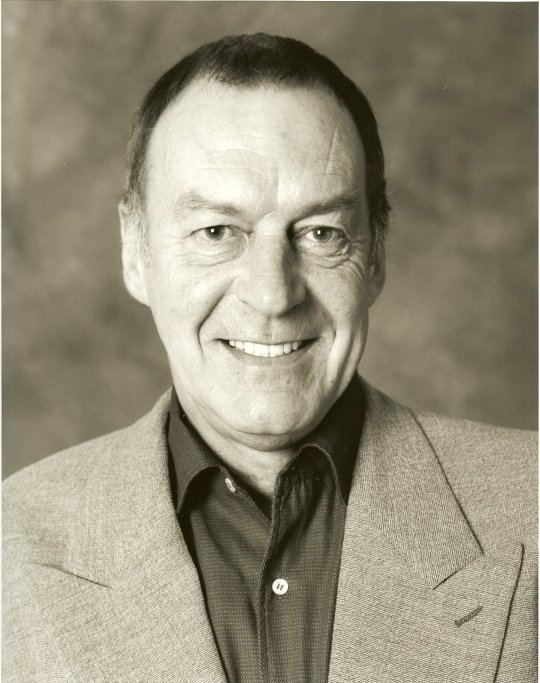
The Grammy and Emmy-winning director Bruce Gowers, who has died aged 82 of an acute respiratory infection, enjoyed huge success in American television through his work on high-profile awards shows including the Emmys, the MTV awards, the Academy of Country Music awards and the Comedy awards. He also directed nine series of American Idol: The Search for a Superstar, which brought him an Emmy award in 2009. He masterminded a string of TV specials for music legends including the Rolling Stones, Prince, Fleetwood Mac and Rod Stewart, and oversaw coverage of President Bill Clinton’s inaugural concert at the Lincoln Memorial, which gathered artists from Michael Jackson and Aretha Franklin to Tony Bennett, Bob Dylan and the rapper LL Cool J.
Another standout addition to his CV was Michael Jackson: 30th Anniversary Celebration (2001), a record of two concerts at Madison Square Garden, New York, peppered with guest stars including Marlon Brando, Liza Minnelli, Ray Charles and Elizabeth Taylor. He won a Grammy for the Huey Lewis long-form video The Heart of Rock’n’Roll in 1986, and a Directors Guild of America award for his work on Genius: A Night for Ray Charles (2004).
But if there was a single event that seared Gowers’ name into the history books, it was his work on Queen’s video for Bohemian Rhapsody (1975). He had already worked with the band, having directed a video of their live performance at the Rainbow theatre, London, in 1974, and they then hired him to make the promo clip for Bohemian Rhapsody to avoid them having to mime it on the BBC’s Top of the Pops. Chunks of the six-minute film show Queen performing the song with their customary flamboyance, but what makes it unforgettable are the sequences where the band’s spectrally lit faces loom against a black background as they sing the song’s multi-layered harmonies. The video took a mere four hours to shoot at Elstree Studios in Hertfordshire at a cost of £4,500, but it became recognised as the moment when the pop music video arrived as an invaluable promotional tool for pop musicians, paving the way for the launch of the MTV music channel in 1981.
“At that time it was a new world, the world of videos, and I didn’t think anyone was that into it for making money,” commented Gowers. “The video was just made for Top of the Pops and I don’t think any of us thought it would go beyond that – certainly not to be used live on stage for over 40 years.” In 2018, he claimed that he had been paid a mere $590 for his work on the project, though a proposed lawsuit to reclaim royalty arrears never materialised. The clip has now been viewed more than 1.5bn times on YouTube.
He was born in West Kilbride, to Robert, a teacher, and Violet. The family later moved to Enfield in north London, and Bruce attended the Latymer school in Edmonton. After a stint at the BBC Training College he entered the industry as a cable puller, cameraman and production manager. Subsequently he worked for Rediffusion and London Weekend Television in both directing and producing capacities, involved in programmes at different times with Kenny Everett and Stanley Baxter, before moving to the US in the late 1970s.
As the music video developed into an increasingly powerful dimension of the music industry, Gowers delivered some of its most memorable specimens. His clip for Prince’s 1999 captured the louche exoticism of Prince and his band, while for the Bee Gees’ How Deep Is Your Love he relied merely on some coloured lights and closeups of the artists’ faces. Gowers matched the sheer preposterousness of Rod Stewart’s Hot Legs with a video that resembles a parody of TV show The Dukes of Hazzard, while for Van Halen’s Dance the Night Away he exploited the band’s dynamic stage presence with a punchy live-perfomance video. For Chaka Khan’s I’m Every Woman he presented viewers with multiple Khans in a contrasting array of costumes.
He proved himself flexible enough to move between a variety of genres. Much in demand for comedy spectaculars for the HBO and Showtime networks, he worked with a string of the biggest names in the business including Robin Williams, Jerry Seinfeld, Billy Crystal and Eddie Murphy. He directed episodes of the showbiz magicians Penn & Teller’s Sin City Spectacular, and enjoyed much success with programming for children in the form of the Teen Choice awards and the Kids’ Choice awards. With his third wife, the writer and producer Carol Rosenstein, whom he first met on the video shoot for Rod Stewart’s Tonight’s the Night in 1976, he created the long-running Kidsongs franchise, which includes a TV show, DVDs and music CDs. Gowers and Rosenstein had been resident in Malibu for 23 years.
She survives him, along with his son, Sean, his stepdaughter, Katharine, and four grandchildren.
🔔 Bruce Gowers, television director and producer, born 21 December 1940; died 15 January 2023
Daily inspiration. Discover more photos at http://justforbooks.tumblr.com
18 notes
·
View notes
Text
Dollar Bin #23:
Carole King's Writer
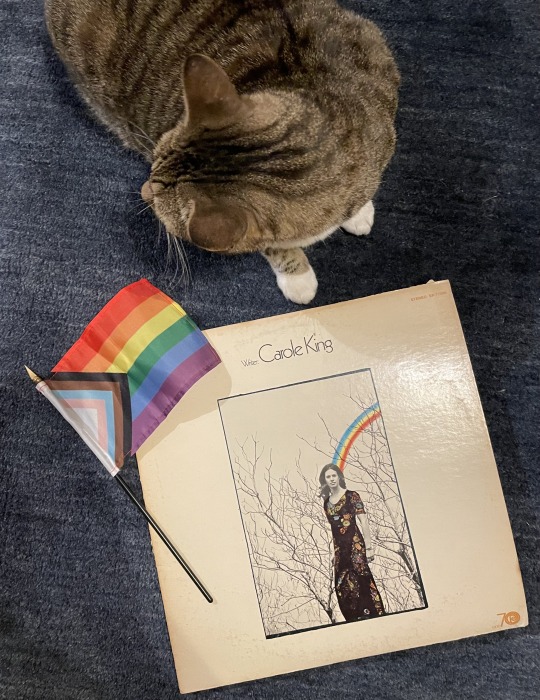
Thrift store dollar bins were packed with copies of Tapestry 30 years ago. Battered copies were straight up ubiquitous, and I blamed the crazy cat lady on cover for taking up space in the bin that I felt should have been given over to all the Lou Reed records I did not yet own. I didn't want Tapestry, or Herb Albert's whipped cream covered lady or that terrifying record with my bearded cousin naked in the arms of Barbara Streisand. I wanted a goddamn copy of The Bells.
I wasn't the only person pissed at poor Carole King. Soon after helping Joni, Aretha and Linda tear down patriarchy's first wall King became terribly unpopular. It took Lauren Graham plopping into bed beside her TV daughter for the public to welcome King back into their ears.
youtube
Good luck getting King's rewritten-for-the-show ode to parental dedication out of your head in the next 24 hours.
But why did King spend the 20+ years before Lorelai as a Dollar Bin villain? Why did Emmylou and Joni get 90's reboots while King got squat? Sure, as the 70's unfurled, King's records faded from transcendent to dull, but let's not kid ourselves: simply put, King was a gangly songwriting genius with a slightly nasal singing voice, and that still only works for people with dicks.
King was so unpopular in the 80's that her biggest credit that decade is the theme song to the Care Bears Movie. Brace yourselves.
youtube
Happily, King eventually escaped from these terrifyingly plush beasts, got a well deserved medal from Obama and grudgingly allowed Lane to play the drums, so don't expect to find a copy of Tapestry in any Dollar Bin these days.
But every other one of King's records is easily and cheaply available, and there's a whole lot to appreciate about King other than Tapestry. The very best place to start is with her first solo record, Writer.
Common misconceptions about King are a) that she and her lyricists stuck to dull, G-Rated topics (like caring-a-lot) and b) that she could not rock. Tapestry lives up to its hallowed status, but it also reinforces these tropes: the only vaguely PG lyrics on Tapestry involve Slapwater Jack's shotgun, and the album contains zero feedback.
But drop the needle on Side 1 of Writer: the first track, Spaceship Races, is wild and weird; had King's cat sat in on this recording session it would have, to quote Steinbeck, crapped a litter of lizards.
youtube
There is so much going on in this song. Okay, the guitar riff isn't exactly J Mascis material, but the drums spur us forward, the bridge slows us down, the closing guitar/piano fade is worthy of a whole additional song and King's jubilant chorus is just what I'd want my R2 unit to spill into the X-Wing's cockpit while I kamikazed joyfully into the Death Star.
Writer also includes King's own take on one of her most covered tracks, Goin' Back. The song was made famous by the Dusty Springfield in 66 and the Byrds in 67 but everyone sings it, from Nils Lofgrin to Phil Collins. I've never heard a version I didn't like (probably because I have not listened to the version by Collins), but King's own recording, with tasteful backing vocals from her friend James Taylor, rocks, swings and sways: Carole understands her own song better than anyone else.
youtube
Goin' Back isn't the only already classic track of her own that King finally claims on this album. I wish there was a copy of the Byrd's Easy Rider theme Wasn't Born to Follow on Writer, but King's even more famous musical manual for self-reflection, Up On The Roof, stands in for it here, a lovely fade at the end of this Dollar Bin classic.
youtube
As you surely know, King had spent all of the 60's writing such songs with her husband/lyricist Gerry Goffin for other performers. Together King and Goffin let Aretha Franklin be a natural woman and invented the Locomotion.
But Writer sees King begin her pivot away from both her marriage (they divorced in 68) and the patriarchal gesture. Her friend Toni Stern (she/her) helps King write for the first time without a man in the room on this record; a partnership that would culminate a year later in one the best individual songs of King's, make that anyone's, entire career, It's Too Late, from Tapestry.
youtube
Here's to the upcoming wave of Gen Z and Gen Alpha non-male singer-songwriters. Let's hope they are a powerful group who are admired not for their cookie cutter looks, heterosexuality or voice, but instead for their genius and their shared loathing of Stephen Stills.
And let's hope they all love and respect Carole King. In other words, let's hope there are a whole more Lucy Dacus's in the pipeline. We need them!
youtube
3 notes
·
View notes
Text
My Hot Take on Jann Wenner
Over the last few days, Jann Wenner did an interview with New York Times about his new book of interviews The Masters: Conversations with Dylan, Lennon, Jagger, Townshend, Garcia, Bono, and Springsteen. As a result of his comments, the Rock and Roll Hall of Fame, which he co-founded, removed him from their board of directors. The comments he made when NYT asked why there were no black artists or female artists in the book, included:
“The people had to meet a couple criteria, but it was just kind of my personal interest and love of them. Insofar as the women, just none of them were as articulate enough on this intellectual level.”
He continued, “Stevie Wonder, genius, right? I suppose when you use a word as broad as ‘masters,’ the fault is using that word. Maybe Marvin Gaye, or Curtis Mayfield? I mean, they just didn’t articulate at that level.”
The next day he issued an apology:
“‘The Masters’ is a collection of interviews I’ve done over the years,” he continued, “that seemed to me to best represent an idea of rock ’n’ roll’s impact on my world; they were not meant to represent the whole of music and its diverse and important originators but to reflect the high points of my career and interviews I felt illustrated the breadth and experience in that career. They don’t reflect my appreciation and admiration for myriad totemic, world-changing artists whose music and ideas I revere and will celebrate and promote as long as I live. I totally understand the inflammatory nature of badly chosen words and deeply apologize and accept the consequences.”
Let me begin my response to this by stating that from a young age of about 9, I was a big fan of Rolling Stone magazine. Over the years many readers have complained and said it's not what it once was, they are stuck in the 60s, yada yada yada. I always enjoyed reading it and I am still a subscriber of their print and digital magazine to this day. Which is why Wenner's interview is so disappointing, anger-inducing, and frustrating.
If Wenner just wanted to release a book of his personal favorite rock stars, just say that. But to call it The Masters and for one of the leaders of music journalism to call it that, it's implying that these musicians are the high standard of rock history. For him to respond to why there were no black or female musicians in his book by saying that they "don't articulate at that level" is false, racist, sexist, vile and ignorant for countless reasons. Off the top of my head:
Rock music as a genre was based on blues music, which was invented by black musicians. Therefore there would be no Rolling Stones, Beatles, etc without blues music and those musicians in his book would easily attest to that.
No black musicians could articulate at that level? Really? Did you really just say that Jann Wenner? Because Rolling Stone has often emphasized black musicians who were the architects of rock music like Chuck Berry, Bo Didley, Little Richard, Ray Charles, Fats Domino, Muddy Waters, John Lee Hooker and more, which is why I'm shocked you'd say that. To completely dismiss black musicians like Curtis Mayfield, Jimi Hendrix, Marvin Gaye, James Brown, Prince, Stevie Wonder, Al Green, George Clinton, Otis Redding, Sly and the Family Stone, Michael Jackson, Smokey Robinson, Sam Cooke, Bob Marley, Run D.M.C., Public Enemy, Living Colour, and the Bad Brains is denying rock history.
Female musicians were often in the background of the early days of rock music, i.e. songwriters, singing in a vocal group, or a back-up singer. But again, Rolling Stone often emphasized female musicians with their frequent Women In Rock issues, most notably their 1997 issue with Tina Turner, Madonna and Courtney Love on the cover. But to deny female musicians like Tina Turner, Dusty Springfield, Ronnie Spector, Aretha Franklin, Janis Joplin, Diana Ross, Joni Mitchell, Debbie Harry, Patti Smith, Stevie Nicks, Madonna, The Go-Go's, The Bangles, Courtney Love, Fiona Apple, Grace Slick, Kim Deal of The Pixies and The Breeders, The Runways, Karen O of the Yeah Yeah Yeahs, Aimee Mann, Liz Phair, Sinead O'Connor, Annie Lennox, Siouxsie Sioux, Beyonce, P.J. Harvey, Kim Gordon of Sonic Youth, Exene Cervenka of X, Tina Weymouth of Talking Heads and Tom Tom Club, Moe Tucker and Nico of The Velvet Underground, The Donnas, and their contribution to rock is irresponsible.
If he is just kissing up to his famous friends and trying to show off the people he's known in his life then that is separate from illustrating the "master of rock music." His apology was just plain egotistical, i.e. 'look at me, I've hung out with Lennon and Bono and I was trying to show that.'
In the last few years it actually seemed like Rolling Stone was trying really hard to prove they were not just covering white males and their coverage / artists on the cover has been very diverse.
In 2020 when they revised Rolling Stone's 500 Greatest Albums of All Time list, The Beatles' Sgt. Pepper was de-throned at #1 and replaced by Marvin Gaye's What's Going On. Whether you agree with this or not, it definitely seemed like RS was trying to prove it wasn't just a list of white males and the list as a whole emphasized many more hip hop and female artists than the previous iteration.
RS itself has been a very progressive publication in music history. A place where they report rock music and the culture around it, i.e. politics, film, art, TV, comedy, etc. They have brought in extremely talented writers like Kurt Loder, Lester Bangs, Ben Fong-Torres, Cameron Crowe, David Fricke, Rob Sheffield, Jancee Dunn, Kim Neely and more. And the magazine itself was a lifeline for music fans everywhere to get the chance to read about music news and musicians you might not be learning about in your regional press and radio (pre-internet era that is). It's too bad that Wenner, who founded this publication is unaware of how out-of-touch his statements are in contrast with what the magazine represents. It does need to be stated that Wenner has not been involved with RS since 2019 and the magazine tried to distance itself from him after his statements. As for the Rock and Roll Hall of Fame, there is a lot to criticize about it, but at its core they are an institution that celebrates the history of rock music and have inducted numerous black and female musicians. Personally, I am appreciative of the fact that they added my documentary Life on the V: The Story of V66 to their Library and Archives' Permanent Collection last year. But I digress. Wenner's opinions do not align with what the Rock Hall is and should be about. This is a clear example of someone who founded a magazine and co-founded a Hall of Fame that is about celebrating music past, present and future and all that encompasses, but yet the founder is completely misguided and ignorant.
In the end, we are all entitled to our own opinions and we can say whoever we want is the best. And yes, this could be a case of a grumpy old boomer looking at rock history through his very narrow tunnel vision. But I just expected way more out of him and less offensive rhetoric.
#jann wenner#rolling stone magazine#music journalism#in the news#rock and roll hall of fame#music nerd
2 notes
·
View notes
Text
🎶✨When you get this, you have to write down 5 songs you actually listen to and post them.✨🎶
Thanks for the tag @enable--llamas 💖
▶ Rules:
🎶✨ when u get this u have to put 5 songs u actually listen to, and publish. then, send this ask/tag 10 of your favorite followers (non-negotiable, positivity is cool)✨🎶
I’m tagging @deniisu-sims @danjaley @misspats3 @twinsimming @suteflower @zoeoe-sims @nectar-cellar @echoweaver @ri-el @mspoodle1! No pressure at all!
1. The entire Diamonds & Dancefloors album by Ava Max - I’m just in love with this 2000′s revival of disco and dance music and the production is just so good. Her vocals are also very complimentary!
https://youtube.com/playlist?list=OLAK5uy_m6R0NV4TdBohYjLttRI_vG0cg9azcEfaM
2. Não Vou Deixar by Caetano Veloso - A beautiful and deep song, directed to Brazil’s government, especifically Bolsonaro, which thankfully has been removed from office by democratic elections. Caetano is really a symbol of Brazil’s resilience, and has been for decades. What a voice and what a mind!
https://www.youtube.com/watch?v=7oOvVvIo1C0&list=RDMM&index=14
3. Linha de Passe by João Bosco - Just a great example of Samba. João Bosco is a powerhouse when it comes to it!
https://www.youtube.com/watch?v=dD26UKDI9SY
4. How Do You Keep The Music Playing by Tony Bennett and Aretha Franklin - No words. Just feelings. What a duo.
https://www.youtube.com/watch?v=Y4_Fatuvp68
5. Bye Bye Brasil by Chico Buarque - My idol Chico Buarque. Lyrical genius and master of music, he’s one for the books. This one is really about the lyrics, but it’s just a tease of what he’s done (check Construção, a really popular one), and will make in the future!
https://www.youtube.com/watch?v=MfXBm7puDic
10 notes
·
View notes
Note
Okay, now I’m curious to know some of your favorite albums if you don’t mind? ‘Cause I can relate A LOT to the way you see Ms. Swift’s albums. And I’m searching for good music, so please give me recs! (Old & new.)
oh boy!! gear up, because i LOVE talking music.
pop:
rae by ashe & ashlyn by ashe (she's such a unique voice in pop today <3)
begin to hope by regina spektor
emails i can't send by sabrina carpenter
strangers forever by maude latour
woman on the internet by orla gartland
build a problem by dodie
bad together by rozzi
ed buys houses by sidney gish
gracetown by san cisco
wrong crowd by tom odell
bad ideas by tessa violet
some feelings by julia nunes
tell it to the volcano by miniature tigers
cuz i love you by lizzo
don't get dark by del water gap
be ok by ingrid michaelson
country:
you don't own me anymore by the secret sisters (LOVING this one lately)
jolene by dolly parton
out among the stars & american IV by johnny cash
lady & gentlemen by leeann rimes
rock:
jade bird by jade bird (OH MY GOD!!!!!)
odessey and oracle by the zombies
hotel tv by lawrence (this is sorta pop/rock/r&b fusion)
combat sports by the vaccines
bad self portraits by lake street dive (my favs)
playing chess by elise legrow
back to black by amy winehouse (EVERYTHING BY HER!)
chills and fever by samantha fish
songs for a sinking ship by april smith and the great picture show
we need medicine by the fratellis
the stranger by billy joel
love tattoo by imelda may
folk/indie:
in between dreams by jack johnson
songs of leonard cohen by leonard cohen (oh my god everything this man touches is GENIUS, he is probably my favorite lyricist of all time)
bridge over troubled water and sounds of silence by simon and garfunkel
wide awake & feathers and fishooks by rayland baxter
autumn fallin' by jaymay
maple ridge by swear and shake
healing and a remedy by upstate (SO underrated, one of my fav albums of all time is healing)
dead and born and grown by the staves
how i knew her by nataly dawn (SO GOOD)
jazz/r&b
lady soul by aretha franklin
lo-fi soul by haley reinhart
somewhere in between by eloise
it could happen to you by chet baker
the jerome kern songbook by ella fitzgerald
the astrud gilberto album by astrud gilberto
ella swings lightly by ella fitzgerald
songs from the heart by johnny hartman
in the wee small hours by frank sinatra
cocktail by rose colella
yesterday i had the blues by jose james
ella and louis by ella fitzgerald and louis armstrong (maybe my fav of all time?)
careless love by madeleine peyroux
#dana answers stuff#i love ALL of these#let me know if you want a specific genre/type of music rec too
4 notes
·
View notes
Text
Cold Culture
By Brotha Monri
Greatly casted shadows from the shell of the city pose in the sunset,
A particular melancholy rests upon the bricks and concrete like light morning dew,
Old leathery fingers of a war vet named “Scrap Iron Willie” hold a sodden cardboard sign ,asking for charitable sustenance,
A 90s Hip hop symphony is heard thundering from speakers of a passing car like the voice of cultures past,
The scene explodes with laughter as old timers reminisce upon the remembrance of “Poochie Woods”and other legends of ghetto gladiators,
Youth representing the remnants of incarcerated fathers march in units of Retro Jordan’s , cellphones and
angry vapors steaming from Snapbacks and distressed denim,
The hustlers jewelry glistens like Christmas lights under the street light as he sits in his chariot plotting world domination with his committee of felonious philosophers with stolen identities,
Names that were lost in times of auction blocks and blacks being bred like oxen,
The ballads whisper softly as grandma pulls sizzling soul food from a cauldron of timeless family ties,
She hums songs of Mahalia Jackson and Aretha Franklin as the lyrics sprinkle down upon her grandchildren’s ears like diamond earrings,
Palestinian markets chime as the doors swing open like saloons of malt liquor and blueberry swisher sweets,
In the parking lot 5 nervous policeman gather around yellow tape,
A burgundy Buick sits sadly riddled with bullets and shattered glass,
163 pounds of cold mahogany flesh and cornrow braids under a Raiders fitted hat lay in its seats staring out at infinity,
Blood encrusts his fingers as he poses in a deathly pose of proven street respect,
He always said he’d die for this game,
True to his words his life martyred for the warriors of the avenues and city blocks,
Now he joins the legends of the fall,
The abandoned buildings smile as the air is infused with another soul of a soulful samurai,
These are the canvases that are painted by the times in which we tread,
Jotted notes describing decaying life and rejuvenated death,
The circle of life force and fearless street titans,
The genius of proverbial wizards exacting spells of financial sorcery,
A ballad of beautifully carved caskets,
Coffins containing cadavers of a charismatic culture of commanding kings and queens conquering the curses of the forgotten kingdom,
Listen and you can hear the drums of the tribes of 24th street gangsters,
The revenge of the fallen are prioritized above the rejected murmurings of a broken cycle,
The legend of lost life must live on in the name of namesake,
Poochie Woods would have never let a man cross his name,
But the consequences are crossing over to the land of the legends,
The legends lost for their reputation and found for their dedication to a cold culture…
#poetry#spilled poetry#spilled feelings#poems on tumblr#original poem#creative writing#streetpoetry#authors
2 notes
·
View notes
Note
The way I see it, she has a talent for finding producers and co-writers that polish her generic teenager songs and make them appear as way more than they are by over-producing the shit out of them... - a couple weeks ago I would not have agreed with you. But over the past few weeks I have sought out other female musicians and am astounded by the talent out there. People would have you believe she is the greatest and no one comes close. I still think she has some really great songs, but the more I discover, the more I realize that perhaps the songs I thought were really genius, weren't all they are cracked up to be. Giving her music up was a lot easier than I thought it would be. I just wish more people could see she isn't the only one worth listening too. But the music media has helped create this narrative that she is the end all and be all. It is too bad for all these other exceptional women who get drowned out. I am not telling people to give her up. By no means. Just encouraging people to look beyond the persona and discover more voices. Women who are talented, insightful, and don't use their platform to harass and abuse people who don't treat them like gods.
Ngl, there aren't that many female singers that I really love, certainly not new ones.
But I do love Diana Krall, Sarah McLachlan, Loreena McKennitt, Moya Brennan of Clannad, Lisa Gerrard, Björk, Florence Welch, Kate Bush. And of course there are the greats like Stevie Nicks, Janis Joplin, Aretha Franklin......the list goes on.
All of them have more real talent in their pinkies than Ms. Swift - because they all have an unmistakable, distinctive style and you will recognise their voices the second you hear them.
Meanwhile, I have trouble telling Katy Perry, TS, Camilla Bello, Demi Levato etc etc etc apart. I may recognise Rhianna...on a good day.
And that last sentence...yes, this.
3 notes
·
View notes
Note
For that movie rec ask game, #1, #8, #21. Hope you're having a good day! 😊
Hi there! I'm having a pretty good day, actually, so thank you! I hope that you're having a good day/night wherever you are 💖
A film from the IMDB Top 250: I just checked the list and holy shit, there's so many fantastic movies on there! If I had to pick one that doesn't get praised enough (in my opinion lol), it's #76-Amadeus. This movie is historical-fiction at its finest, following a fictitious and almost one-sided rivalry between Wolfgang Amadeus Mozart and Antonio Salieri. It explores the ideas of genius and mediocrity, and how far a person would be willing to go to achieve greatness and immortality. My mom introduced me to this movie as a kid, and it's been one of my favorite biopics ever since lol if you don't mind historical-inaccuracy for the sake of art and an annoying high-pitched laugh, then you'll absolutely love it!
8. A film from the year you were born: I never realized how many great movies came out in 1996! Muppet Treasure Island, The Birdcage, Dragonheart, The Hunchback of Notre Dame, Matilda, The First Wives Club, Romeo+Juliet, and Scream are all fantastic, but the one that I really wanna highlight is That Thing You Do! or as I like to call it, the best movie about a fictitious one-hit wonder band. First of all, this movie wouldn't work without the perfect, most catchy title song ever (props to songwriter Adam Schlesigner) and without the cast's insane chemistry. It's charming, plain and simple, and it always manages to put me in a good mood whenever I put it on!
21. A film with a great needle drop/soundtrack/score: The other two movies I talked about could absolutely fit this bill, but I'm gonna go ahead and pick The Blues Brothers. This soundtrack...is insane! It's filled with songs sung by John Belushi, Dan Aykroyd, Ray Charles, James Brown, Aretha Franklin, and Cab Calloway, and that's just the official soundtrack; the film soundtrack includes songs sung by Fenton Robinson, Elmore James, Sam & Dave, Otis Redding, Louis Jordan, John Lee Hooker, and Fats Domino. It's a love letter to Blues/Blues Rock, R&B and Soul music, and it's such a great soundtrack to listen to while you're driving (but be warned, it might make you wanna drive through a mall and get into a high-speed chase with the cops, a Country Western band and the Illinois Nazis lol).
Movie Rec Ask Game
#this was fun!#ask away!#movie rec ask game#movie recommendation#amadeus#that thing you do!#the blues brothers
1 note
·
View note
Link
Check out this listing I just added to my Poshmark closet: VTG 1960 Style Blazer & Pants Worn In Genius Aretha, 46L, 38W/30L.
0 notes


